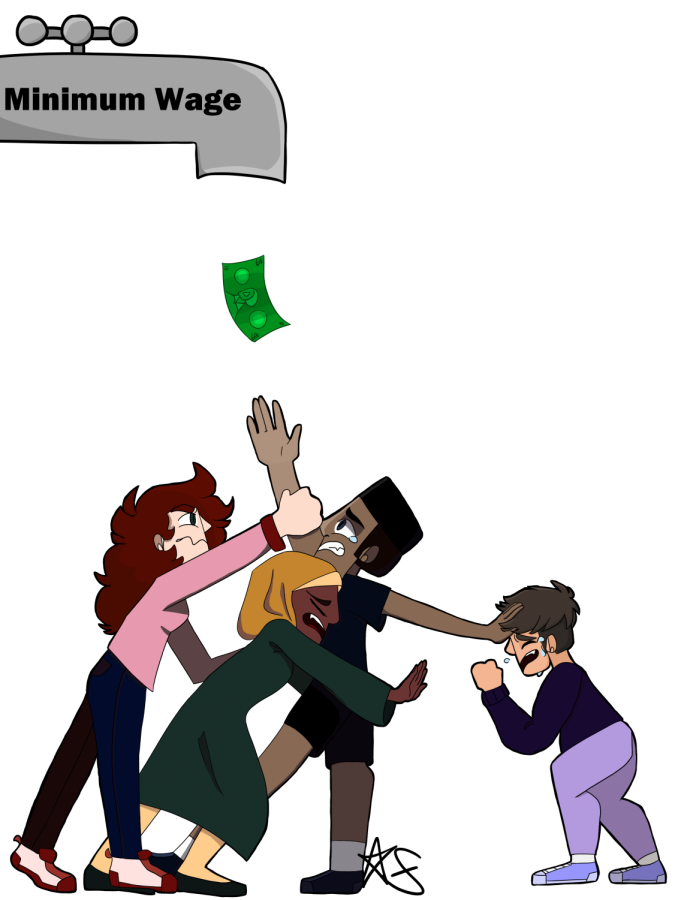Maximize the minimum wage
Living is expensive; that’s just the harsh reality of life. Those fortunate enough to maintain a steady and well-paying job may not encounter the rough obstacles that many people in America are facing today. For a majority of Americans, living paycheck-to-paycheck is the harsh truth of life.
Minimum wage is a controversial topic that has been argued back and forth many times over the years. Some argue that raising the minimum wage would create more problems than it would solve. However, many claim that a boost to minimum wages across the country is long overdue. This stems from the idea that those working minimum wage jobs do not provide the financial means to sustain themselves even while working full-time, hence the term “living wage,” which refers to the bare minimum income required for a worker to meet the basic necessities.
According to a study conducted by the Brookings Institution, 53 million workers in the U.S. aged 18 to 64 are working low-wage jobs. Today, many minimum wage jobs are usually those that require very limited education and are most commonly seen in the industry of retail or fast food. While there are some states in the U.S. with minimum wages above the federal standard, some still stick to that age-old number—$7.25 per hour.
In Minneapolis, the minimum wage will be raised to $15 due to a passed ordinance, and effects of this will be seen in 2024, when the estimated average salary would be around $85,000. Supporters of this change argue that a higher wage is crucial as the cost of living continues to inflate as living costs in Minneapolis for a single person is approximately $965 monthly and around $3,453 for a family of four. Some quick math bears this out: a person can work 40-hour minimum wage work-weeks and barely pay for the basic costs of living, even if it’s living alone. Those in this situation with a family to support struggle more immensely as one might have to choose between food in the stomachs of loved ones or working utilities.
“If [minimum wage] went up, and I was getting paid more I would save money because then I wouldn’t just have this small amount of money that’s gone after I pay bills,” Kurt Zemlika (10) said. “I’d be able to save for things that I need more like clothes and things that’d make me [happier].”
For Columbia Heights, as of now, minimum wage has not been brought up for discussion, however, one city council member has strong beliefs on the subject.
“As a council member, I personally believe that our city wages should have a minimum wage of $15, and the minimum wage for city businesses need to be raised to at least $15.” Columbia Heights council member Connie Buesgens said in an email interview.
One more Heights official of a higher, authoritative power expressed their own opinion. “When it comes to private business owners in Columbia Heights, if they want to get and keep their good employees, they will have to evaluate what that pay will be,” Columbia Heights mayor Donna Schmitt stated in a separate email interview. “City government doesn’t need to control minimum wage in our city. The competition for jobs will determine what that wage will look like.”
There’s no question when coming to live on a minimum wage budget, most people—approximately 78% of Americans—are just trying to survive day-to-day in our capitalistic world.
Many people have come to work and live these low-income lifestyles, but that doesn’t mean they should be denied basic human rights and comforts. Minimum wage should be moderately raised all across the board for the many positive benefits.
For instance, with increased wage comes with increased spending, resulting in more demand and creating more jobs. Additionally, employees will stick with their employers longer, saving money for the company as they won’t have to hire and train new employees in cases of a former leaving. However, some will point out that raising minimum wage will harm small businesses as they won’t be able to keep up with paying their employees and may have to lay off some employees to keep their title. Though, some may also argue that small businesses will be fine or better off as a higher wage would only increase work productivity combined with the increased consumer spending.
“I’m in favor of [a raised minimum wage],” social studies and Economics teacher Dan Tschida said. “It leads to more money flowing to people who need it and less profit for Wall Street.”
Raising one’s wage a few dollars higher can result in dramatic life changes. People would be allowed to save larger amounts of money but also splurge quicker on things that would otherwise take a substantial time to acquire, such as a family trip or a new phone, and ultimately feed the economy, which creates more demand and in turn creates more employment opportunities. Nevertheless, in our world today, including right here in Columbia Heights, a lot more cents makes a little more sense.

Sachi Yang is a Junior here at CHHS. He is the Opinion Editor for the Heights Herald! He wanted to join the Heights Herald to better his writing skills...







